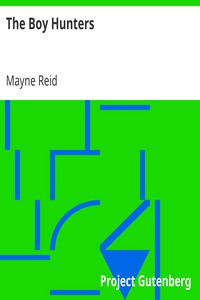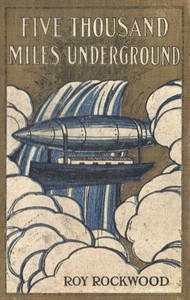The Boy Hunters, Mayne Reid [best love novels of all time .TXT] 📗

- Author: Mayne Reid
Book online «The Boy Hunters, Mayne Reid [best love novels of all time .TXT] 📗». Author Mayne Reid
Curious to witness the dénouement, our hunters continued to lie quiet in their ambush among the willows.
The antelopes had all turned in the track of their leader, and were following him in the new direction, like soldiers marching in single file. They went slowly, with outstretched necks and eyes protruded, gazing steadfastly on the strange objects before them. When within a hundred yards or so of the wolves, the leader stopped, and sniffed the air. The others imitated him in every movement. The wind was blowing towards the wolves, therefore the antelopes, who possess the keenest scent, could benefit nothing from this. They moved forward again several paces, and again halted, and uttered their snorts as before, and then once more moved on. These manoeuvres lasted for some minutes; and it was evident that the spirits of fear and curiosity were struggling within the breasts of these creatures. At times the former seemed to have the mastery, for they would tremble, and start as if about to break off in flight. Curiosity would again prevail, and a fresh movement forward was the consequence.
In this way they advanced, until the headmost had got within a few paces of the wolves, who lay all the while as still as mice or as cats waiting for mice. Not any part of them was seen to move, except the long hair of their tails that waved slightly in the breeze; but this only excited the curiosity of the antelopes to a greater degree.
The leader of the herd seemed all at once to grow bolder. He was a stout old buck—what had he to fear? Why should he dread such creatures as these, without heads, or teeth, or claws, and evidently incapable of moving themselves? No doubt they were inanimate objects. He would soon decide that question, by simply stepping up and laying his nose upon one of them.

He was instigated, moreover, by a species of pride or vanity. He wanted to show off his courage before his followers, who were mostly does; many of them his wives too—for the old antelopes are shocking polygamists. It would never do to appear timid in the eyes of the fair does; and he was determined to cut a swagger. Under this impulse, he walked boldly up, until his sharp snout touched the hair of one of the wolves.
The latter, who had been all the time peeping from under his tail, waiting for just such an opportunity, now sprang to his feet, and launched himself upon the throat of the antelope. His comrades, uncoiling themselves at the same instant, followed his example; and the next moment the prong-horn was dragged to the ground, and worried by the whole pack!
The frightened herd wheeled in their track and scattered right and left. Some ran in the direction of the hunters; but so swiftly did they bound past, that the shots of the latter, aimed in haste, whistled idly over the prairie. Not one of them appeared to have been touched; and, in a few seconds, not one of them was to be seen. They had all escaped, except their leader, who was by this time dying under the teeth of the wolves.
“Well, we shall have him at all events,” said Basil. “Load your guns, brothers! give the wolves time to kill him outright; we can easily run them off.”
“Very kind of them,” added François, “to procure us fresh venison for supper. Indeed we might not have had it but for their cunning. We have done them some service during our journey; it is almost time they should make us a return.”
“We had better make haste, then,” said Lucien, loading at the same time with his brothers; “the wolves appear to be very busy; they may tear our venison to pieces. See! what a scuffle!”
As Lucien said this, the eyes of all were turned upon the wolves. The latter were leaping about over the body of the antelope, now in a thick clump, now more scattered, but all the while apparently worrying the animal to death. Their jaws were already blood-stained, and their bushy tails swept about and above them in ceaseless motion. The hunters made all haste in reloading, lest, as Lucien had suggested, the wolves might spoil the venison. They were not more than a minute engaged in ramming down the bullets, and fixing the caps on the nipples of their guns. When this was done, all three ran forward together—Marengo in the advance, with outstretched neck and open mouth, eager to do battle with the whole pack.
It was but three hundred yards to the spot where the wolves were; and when our hunters had got within range, all three stopped, levelled their pieces, and fired. The volley took effect. Two were seen kicking and sprawling over the grass, while the others, dropping their prey, scampered off over the prairie. The boys ran up. Marengo leaped upon one of the wounded wolves, while the other was despatched by the butts of their guns. But where was the antelope? There was no such animal to be seen; but, in its stead, half-a-dozen fragments of mangled skin, a horned head and shanks, with a clump of half-picked, ribs and joints! And this was all that was left of the poor prong-horn—all that was left of that beautiful form that, only a few moments before, was bounding over the prairie in the full pride of health, strength, and swiftness!
The boys contemplated his remains with feelings of disappointment and chagrin; for, although there was still plenty of bear-meat, they had anticipated supping upon fresh venison. But neither “haunch” nor “saddle” was left—nothing but torn and useless fragments—so, after sundry sharp ejaculations against the wolves, they left Marengo to make his best of the débris, and, walking back slowly to the camp, seated themselves once more upon the stones.
They had not rested more than five minutes, when their attention was again attracted to the prairie. Another herd of antelopes! Strange to say, it was; and, like the former, these were making directly for the spring. The hunters knew they were not the same; for this herd was much larger, and there were several males in it, easily distinguishable by their forked horns.
The guns were again loaded, and Marengo was called up—lest he might frighten them off.
These, like the others, marched in order, in single file—led by a large buck. There appeared to be about thirty or more in this herd. They had, no doubt, been pasturing all day on some far plain, and were now on their way to the water, determined to have a good drink before going to rest for the night.
When they had arrived within four or five hundred yards of the spring, they turned slightly to the left. This brought them at once to the rivulet—where they entered, and having drunk, went out again, and commenced browsing along the bank. It was evident they did not intend coming any nearer to the butte, or the grove of willows, where our hunters had concealed themselves. This was a disappointment. All three had once more set their minds upon an antelope supper; and now their chances of getting it seemed every moment growing less—as the animals, instead of coming nearer, were browsing away from them over the prairie. There was no cover by which they might be approached. What, then, could the hunters do, but leave them to go as they had come?
But there was an expedient which suggested itself to the mind of Basil. He had heard of it from old hunters; and the curious conduct of the first herd, so lately shown in regard to the wolves, recalled it to his remembrance. He resolved, therefore, to try this expedient, and secure an antelope if possible.
Cautioning his brothers to remain quiet, he took up one of the red blankets that lay near. He had already cut a long forked sapling, and sharpened it at one end with his knife. He now spread out the blanket, holding it up before him; and, with his rifle in one hand, and the sapling in the other, he passed out of the willows into the open ground—keeping the blanket between him and the animals, so that his body was completely hidden from them. In this way he advanced a few paces, walking in a bent attitude, until he had attracted the attention of the antelopes. He then stuck the sapling firmly in the ground, hung the blanket upon its forks, and knelt down behind it.
An object so odd-looking, both as regarded form and colour, at once excited the curiosity of the herd. They left off feeding, and commenced approaching it—halting at short intervals, and then continuing to advance. They did not move in single file—as the former herd had done—but first one, and then another of the bucks took the lead, each wishing to make a display of his courage. In a few minutes one of the largest was within range; when Basil, who was lying flat along the grass, took sight at the animal’s breast and fired.
The buck leaped up at the shot; but, to the great disappointment of the marksman, turned in his tracks, and fled along with the rest of the herd, all of which had bounded off on hearing the crack of the rifle.
Basil beheld this with some surprise. He had taken deliberate aim; and he knew that when he did so, it was seldom that his rifle failed him. He had missed this time, however, as he thought, when he saw the antelope run off apparently unhurt; and, attributing his failure to the hurried manner in which he had loaded his piece, he took up the blanket, and turned with a mortified look towards his companions.
“Look yonder!” cried François, who still watched the retreating antelopes; “look at the wolves! Away they go after.”
“Ha!” exclaimed Lucien, “you have wounded the buck, brother, else the wolves would never follow. See! they are running upon his track like hounds!”
Lucien was right. The animal was hit, or the wolves would not have embarked in a chase so hopeless as the pursuit of a prong-horn; for, strange to say, these cunning creatures can tell when game has been wounded better than the hunters themselves, and very often pursue and run it down, when the latter believes it to have escaped! It was evident, therefore, that Basil had hit the animal—though not in a deadly part—and the wolves were now following with the hope of hunting it down.
A new idea came into Basil’s mind. He thought he might yet be in at the death; and with this idea he ran up to his horse, drew the picket-pin, and leaping upon his bare back, directed him after the chase. He was soon in full gallop over the prairie, keeping the wolves in sight as he went. He could see the antelope, he had fired at, some distance ahead of the wolves, but far behind the rest of the herd, and evidently running heavily and with pain.
It cost the young hunter a





Comments (0)